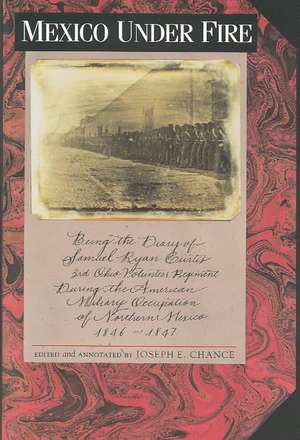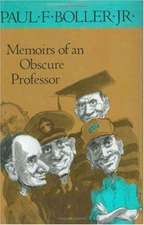Mexico Under Fire, Being the Diary of Samuel Ryan Curtis, 3rd Ohio Volunteer Regiment, During the American Military Occupation of Northern Mexico, 184
Autor Samuel Ryan Curtis, Samual R. Curtis Editat de Joseph E. Chanceen Limba Engleză Hardback – 30 iun 1994
Colonel Samuel Ryan Curtis, engineer, lawyer and graduate of West Point, arrived in Mexico in July of 1846 as commander of the 3rd Ohio Volunteer Regiment to find a volatile and chaotic situation in occupied towns along the Rio Grande. American civilians of the lowest sort--men and women--mingled with Mexican townspeople, robbing, murdering, and raping. Neither civil nor military law made provisions for governing municipalities under such conditions. Nor was the U.S. military prepared for a guerrilla struggle against renegade Mexican soldiers and bandits. This is Curtis's story of maintaining order under nearly impossible conditions--of death and suffering in his regiment from disease, not fighting, and of the tedium of army camp life.
Curtis was a keen observer who chronicled martial unrest and political conditions in Matamoros, Camargo, and Saltillo. He also documented social and economic circumstances, as well as flora and fauna, and even the weather.
Preț: 172.17 lei
Nou
Puncte Express: 258
Preț estimativ în valută:
32.95€ • 35.23$ • 27.47£
32.95€ • 35.23$ • 27.47£
Carte disponibilă
Livrare economică 28 martie-11 aprilie
Preluare comenzi: 021 569.72.76
Specificații
ISBN-13: 9780875651279
ISBN-10: 0875651275
Pagini: 308
Dimensiuni: 161 x 236 x 30 mm
Greutate: 0.66 kg
Ediția:New.
Editura: Texas Christian University Press
ISBN-10: 0875651275
Pagini: 308
Dimensiuni: 161 x 236 x 30 mm
Greutate: 0.66 kg
Ediția:New.
Editura: Texas Christian University Press
Notă biografică
Textul de pe ultima copertă
Colonel Samuel Ryan Curtis, engineer, lawyer, and graduate of West Point, arrived in Mexico in July of 1846 as commander of the 3rd Ohio Volunteer Regiment to find a volatile and chaotic situation in occupied towns along the Rio Grande. American civilians of the lowest sort - men and women - mingled with Mexican townspeople, robbing, murdering, and raping. Neither civil nor military law made provisions for governing municipalities under such conditions. Nor was the U.S. military prepared for a struggle against Mexican guerrilla forces and desperate bandits. Colonel Curtis was a diary keeper, and this record of his experiences in Mexico gives a clear picture of his efforts to restore and maintain order under nearly impossible conditions: of death and suffering in his regiment from disease, not fighting, and of the tedium of army camp life. A reflective man as well as an educated one, Curtis was a keen observer. He documented social and economic circumstances, flora and fauna, and the weather, even as he chronicled political conditions and martial unrest. The resulting diary is a major contribution to studies of the Mexican War.





















